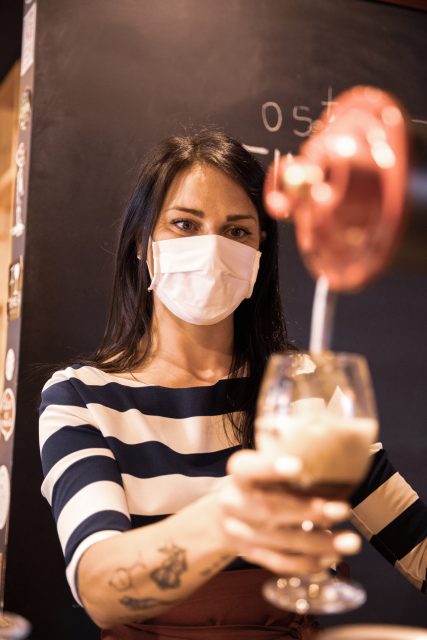In focus: How the UK on-trade is faring since reopening
Pubs have been fully reopen for only a week, so it is too early to know whether the hoped for spending spree is taking place despite the plethora of press photos of customers brandishing glasses in celebration. But initial reports are hopeful.

On day one of full reopening sales at Britain’s restaurants, pubs and bars were up by a quarter on pre-Covid levels, according to research consultancy CGA. Food sales by jumped 29.6%, while drinks sales were up by 21.2%, it said.
Some number crunchers reckon the hospitality sector could benefit this summer from the public spending an extra £12 billion or so it has accumulated in pockets and purses over the past 18 months of lockdowns and restrictions.
Couple a major sporting event with a hot summer day and a pub could possibly triple its normal takings – and the Euros soccer tournament kicks off under a month. Strong performances from the home nations would prompt smiles both sides of the bar.
Sales of draught cider are said to have rocketed by 344% on the day that England played Sweden in the World Cup quarter-final in July 2018.
But how far would a bumper summer help to restore the battered sector’s finances? How parlous are they? Remember, nobody has made a profit for more than a year and many outlets are teetering on the brink.

Evidence of the hits taken by enforced Covid closures came last week, when two of Britain’s biggest pub companies unveiled their most recent half-year figures showing cumulative losses of more than £300 million and £1.1 billion in lost sales.
Mitchells & Butlers, which owns 1,750 outlets including the All Bar One and Harvester chains, made a pre-tax loss of £200 million, almost twice the £121 million hit it took in the first half of last year when its pubs were open until late March.
Marston’s suffered a similar fate, its loss plunging from £31.1 million to £105.5 million.
Neither group was helped by this year’s cold spring weather, which undoubtedly deterred some customers from taking shelter in marquees and pods and under awnings and umbrellas when businesses were allowed to open outside from 12 April.
Partner Content
Even so, both were looking into glasses half full rather than half empty. Ralph Findlay, Marston’s chief executive, said that while turnover in the half-year to 3 April had fallen from £343.3 million to just £55.1 million, trading since 12 April had been better than he had expected.
“We traded at about 80% of 2019 sales, which I think was extraordinary. We also broke even in April, which was again something I didn’t expect,” he said.
That will be some cheer to shareholders in Marston’s, which runs 1,500 managed, franchised and leased pubs, after it rejected an opportunist £666m takeover bid from Platinum Equity Advisors in February.
Phil Urban, M&B’s chief executive, said the first days of indoor reopening were positive. “Bookings were through the roof with people coming for meals with friends and family for the first time in a very long while,” he was quoted as saying.
Many pubs did not reopen until 17 May, however, for a variety of reasons, notably the lack of outside space and the costs of staffing for outside service in the face of potential poor weather.
One independent publican even told db that his decision not to open until last week had been finely balanced but was tipped in favour of remaining shut because an unreliable wi-fi service made it impossible to take electronic payments outside.
There is a bound to be a ‘novelty’ factor involved in the positive numbers reported by both M&B and Marston’s. “I suspect it will tail away and it’ll be three weeks before we’ll know where we’re really at,” said Urban.
That is when the government will announce whether lockdown restrictions will be lifted fully on 21 June, as the final part of its road map.
“It would obviously be very unhelpful if they prolonged the restrictions because as a sector we can’t return to real profitability until they are lifted”, Urban told The Times.
Kate Nicholls, the chief executive of UK Hospitality, echoed that thought saying: “It is critical that Government restores our ability to trade profitably by removing all restrictions on 21 June as planned – let’s not forget that all of these businesses which are open are still making a loss until they do.”




